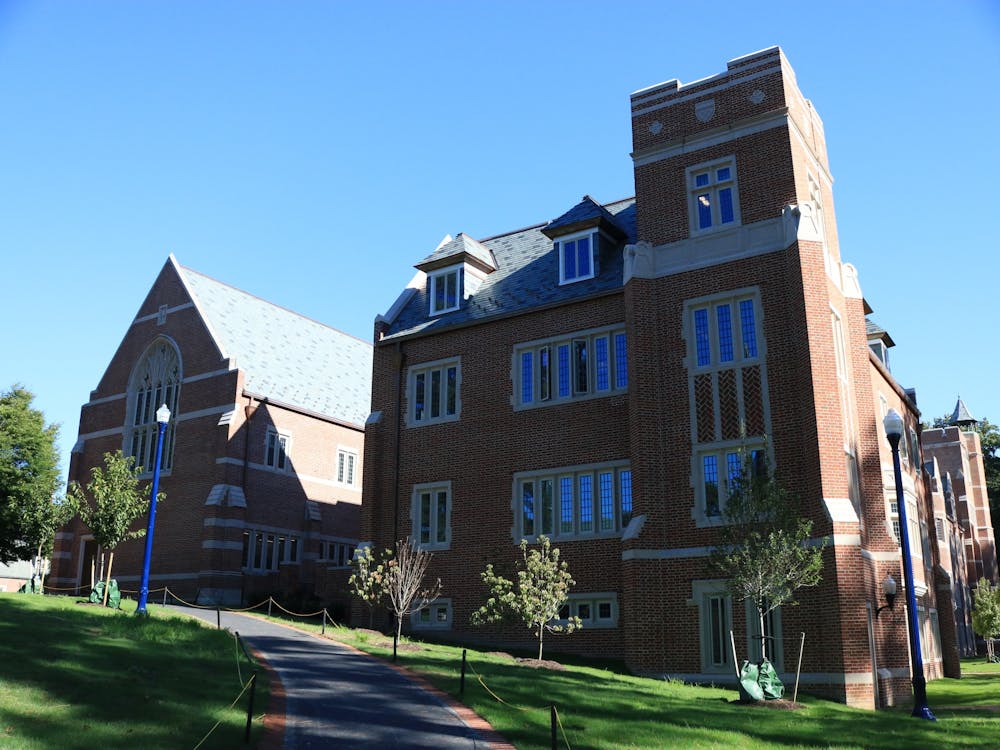Collegian Reporter
Writing doesn't become easier or less nerve-wracking said Peter Carey, a two-time Booker Prize winner who came to Richmond yesterday as part of the 2008-09 Writer Series.
"You live with uncertainty and doubt, and you should," he said. Writers are never free from the risk of failure, he said.
About 60 people showed up for the reading, which took place at 7 p.m. in the Brown Alley room in Weinstein Hall. Associate English Professor David Stevens introduced Carey to the audience as a writer routed in versatility. Carey is like a fly on the wall moving from one artful room to another, never satisfied staying in one for too long, Stevens said.
Carey alternated between reading excerpts of his most recent novel, "His Illegal Self," and telling anecdotes from his life. Among many things, he received inspiration and ideas for his novels from living among hippies, as well as remembering in great detail his favorite parts of Australia while he was living in New York, he said.
"One of the things I loved about writing this book was to find all this stuff in my head about this place," he said. "It was a pleasure just to write about this country."
Carey is the most prominent Australian novelist working today, as well as one of two people in the world who have won the Booker Prize twice, Stevens said. He received his first Booker Prize in 1988 for his novel "Oscar and Lucinda," and his second in 2001 for "True History of the Kelly Gang."
The irony of that is that he's lived in the United States for the last several decades, Stevens said. He came here in the seventies, and has been a writer and teacher of writing in the New York City area at schools such as Hunter College, The New School and Queens College, he said. He is currently the executive director of the Master of Fine Arts in Creative Writing program at Hunter College.
"He's talented not only as a novelist, but also as somebody who can talk about writing to students," Stevens said. "He has written novels that cross the literary landscape. One of the reasons he has done so well is that he appeals so broadly to many readerships."
This is the third year that the English Department has sponsored the Writer Series. The English Department is interested in bringing authors to campus who are prominent globally, but might not be featured in classes that students are taking, Stevens said.
English professors wanted to broaden students' sense of what good writing could be and where it was coming from, he said. The purpose behind listening to a reading is to expose people to something they may not have picked up on if they were reading themselves, Stevens said.
Enjoy what you're reading?
Signup for our newsletter
But, Carey said he believed public readings were a betrayal of the book, he said.
"What I mean is for you to read it," he said. When he's writing, Carey is thinking that people will be reading it themselves, not being read to, he said. When he reads out loud, people can imagine less, he said.
After the reading, there was a question and answer session so that people could ask Carey questions about his books or about his writing process.
"That's what is most valuable about these visits," Stevens said.
Several people had questions for Carey. One student asked him what his first story was about. He didn't answer because he didn't want to look silly, he said.
But he said he was lot better of a writer than he was when he started in 1970.
"If you work hard and long enough, you'll figure it out," he said.
Students said they thought that Carey was a lot more entertaining than they expected a writer to be.
"I want to read his books now," Junior Ally Watkins said. "It was surprising how funny and goofy he was."
Sophomore Janine Landrey said her favorite part about the reading was learning what Carey was like when he was 21.
"It was nice to hear how he started and how far he has come," she said.
Earlier during the afternoon, Carey met with interested students before the reading, many of whom wanted to talk to him about the ideas of process and craft, Stevens said. "It becomes a nice intermittent discussion about writing."
Meeting with students to talk about writing is Carey's favorite part about visiting colleges and universities, he said. Students are always interested in what it was like starting out, Carey said.
"You leave feeling like you've done something."
Contact reporter Taylor Engelson at taylor.engelson@richmond.edu
Support independent student media
You can make a tax-deductible donation by clicking the button below, which takes you to our secure PayPal account. The page is set up to receive contributions in whatever amount you designate. We look forward to using the money we raise to further our mission of providing honest and accurate information to students, faculty, staff, alumni and others in the general public.
Donate Now


